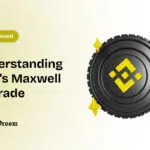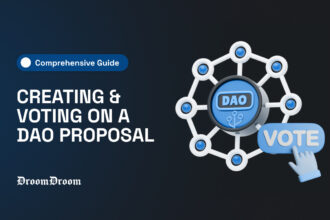Blockchain is more than just the technology behind cryptocurrencies; it’s a game-changer for how we’ll carry out digital transactions and trust in the future. Blockchain is reshaping sectors like healthcare, finance, supply chains, and even how we govern, thanks to its ability to keep data secure and unchangeable.
Generally increasing adoption of blockchain has created a demand for developers who can harness its potential to develop solutions for businesses and organizations. These developers start from scratch, transforming code into contracts and applications that can operate without central control.
This guide is a roadmap for individuals interested in exploring blockchain at any level, whether they are beginners or experienced developers looking to switch gears. It aims to guide on this development journey, which offers endless possibilities with every line of code contributing towards a digital and decentralized future.
Understanding Blockchain Developer Fundamentals
Blockchain technology is centered around a decentralized and transparent ledger that ensures security and immutability. This digital ledger operates across a network of computers on the internet, recording transactions to prevent any tampering or corruption once the data is added. For those aiming to become developers, understanding these core principles is essential.
The strength of technology relies on three components;
Private Key Cryptography
This security measure provides individuals with a code called a key, which enables secure transactions and verifies ownership of blockchain assets. It acts as the equivalent of an identity verification system.
Distributed Network
Instead of being stored in one location, the ledger is replicated across multiple nodes or computers in a distributed network. This network collectively validates data and transactions through consensus mechanisms, significantly reducing fraud risks and tax evasion possibilities.
Incentives
An incentive structure is implemented to motivate individuals to maintain security standards within the system. These incentives often take the form of tokens or cryptocurrencies awarded to miners or validators who carry out tasks related to servicing the blockchain and verifying transactions.
Blockchains can be classified into public, private, permissioned, centralized, or decentralized. The classification depends on who can participate and how transactions are verified. Each blockchain is managed by a group or community that uses cryptography to ensure the security consistency and universal accessibility of transactions. Understanding these aspects is crucial for those who want to contribute to advancing blockchain applications and driving innovation in this rapidly evolving domain.
Mastering The Tools of Trade
Becoming a blockchain developer requires understanding the technical tools that bring blockchain applications to life. One crucial aspect is programming languages, where Solidity stands out for Ethereum-based applications. It has similarities to JavaScript. Its primary purpose is to create contracts that operate on the Ethereum Virtual Machine (EVM).
Python, renowned for its straightforwardness and adaptability, also contributes to the development process. Its syntax is easy to understand as it offers a range of libraries, making it an ideal option for constructing blockchain frameworks and managing various operations.
Regarding development platforms, Ethereum is highly regarded as an environment for applications. Its widespread adoption has resulted in a community knowledge base, making it a popular choice among developers.
On the other hand, Hyperledger offers enterprise-grade, permissioned frameworks known for their modularity and versatility in private blockchain solutions. One of its flagship frameworks is Fabric, which allows the integration of components like consensus and membership services.
In addition to programming languages and platforms, version control systems like Git are tools in a developer’s toolbox. These systems enable coding efforts by facilitating code management.
Integrated development environments (IDEs), like Remix for Solidity or PyCharm for Python, make the coding process more accessible by offering features for development. Using these tools goes beyond knowing how they work; it also involves understanding how they fit into the blockchain world. Becoming skilled at using these tools and maintaining a learning mindset sets apart a blockchain developer in this rapidly changing field.
Developing Smart Contracts and Decentralized Applications (DApps)
Crafting contracts requires programming to automate and enforce contractual agreements on the blockchain. These contracts, written directly into code, play a role in the functionality of the blockchain by eliminating intermediaries, reducing costs, and enhancing execution speed.
The development process starts with defining the logic of the contract to ensure that it accurately represents the intent of the agreement. Solidity, the language for Ethereum contracts, demands attention to detail and a deep understanding of blockchain peculiarities.
Following practices such as keeping the code simple and modular when coding contracts is essential. This approach facilitates maintenance and upgrades while minimizing vulnerabilities. Security is of importance since deployed contracts are immutable on the blockchain. Adhering to design patterns like checks effects interactions can help mitigate risks and prevent issues like reentrancy attacks.
Comprehensive testing is equally vital; unit tests, integration tests, and testnets should be employed to simulate conditions under which a contract must be performed. Frameworks like Truffle provide testing tools designed for contracts, ensuring their expected functionality before deployment.
When it comes to decentralized applications (DApps), they combine user interfaces with contracts. Creating these interfaces requires web development skills to ensure interaction with the arrangements. The goal is to provide users with an intuitive application.
The final step in deploying contracts is transitioning them from a test environment to the blockchain. The transition requires consideration of gas costs and optimization to ensure efficiency and sustainability.
Following these practices throughout the development lifecycle of contracts and DApps distinguishes successful blockchain developers and guarantees efficient and user-centric applications.
Solidity Proficiency And Its Role In Blockchain Development Careers
Solidity is the backbone for programming on the Ethereum blockchain, functioning as an accessible high-level language with object-oriented features. This language simplifies the development process by providing ready-to-use code segments, facilitating the creation of smart contracts and decentralized applications.
While it is considered more approachable than Bitcoin’s Script, proficiency in Solidity still necessitates a comprehensive grasp of blockchain technology. Learning Solidity is essential for those who delve into smart contract development or Ethereum-related coding.
Despite the learning curve, individuals with knowledge of mainstream programming languages like C++, Java, JavaScript, or Python may find Solidity comparatively welcoming. The timeline for learning Solidity can vary from a month to half a year, depending on one’s familiarity with programming basics and dedication to the learning process.
Cartesi’s The Blockchain OS is making strides to enable developers to bypass Solidity to bridge the gap between blockchain and mainstream development. It allows for creating DApps using prevalent languages such as Python, aided by the extensive tools, libraries, and services developers are accustomed to.
This innovation is paired with a Linux environment, all while overcoming the traditional scalability challenges associated with blockchains. The Blockchain OS is paving the way for a new era where developers can leverage their existing skills to venture into blockchain technology seamlessly.
Navigating The Blockchain Ecosystem
The field of blockchain is an ever-evolving landscape filled with technologies and innovations. As a developer, it’s essential to understand this environment to find your niche and specialize within it.

This ecosystem starts with blockchains, each offering features and use cases. While Bitcoin introduced the concept of ledgers, Ethereum truly expanded the possibilities by introducing programmability. In addition, other chains, like Binance Smart Chain, Cardano, and Solana, have emerged with their strengths in terms of speed, costs, and contract capabilities.
Cryptocurrencies are widely recognized as assets; however, as a developer, you may find yourself drawn toward the field of Decentralized Finance (DeFi), which leverages blockchain technology to recreate and innovate on instruments without relying on traditional intermediaries.
Another fascinating development in this space is fungible tokens (NFTs). These unique digital assets are verified using technology. It has revolutionized digital ownership across various areas, such as art, collectibles, and real estate. Building platforms or marketplaces for NFTs can be a specialization for developers.
To navigate this evolving industry successfully, developers must engage in learning and actively participate in communities. Online forums, blockchain conferences, and hackathons provide opportunities to stay updated on the trends and technologies.
Discovering your niche involves:
- Specializing in blockchain.
- Honing your skills in securing contracts.
- Concentrating on the application layer through DApps.
The crucial aspect is comprehending how your passion as a blockchain developer aligns with market needs, creating a role that adds value to the evolving blockchain ecosystem.
Other Career Opportunities In The Blockchain Industry
The field of blockchain is experiencing growth, providing career opportunities in various roles. Key professions within blockchain;
Blockchain Developers
As discussed earlier, blockchain professionals play an essential role in creating applications and are highly sought after across industries such as finance and healthcare.
Blockchain Architects
This group of individuals specializes in designing and overseeing the implementation of solutions. They possess programming skills and an understanding of data science and cryptography.
Blockchain Administrators
These experts are responsible for managing and maintaining the infrastructure of systems. Their expertise lies in UNIX Linux and a comprehensive knowledge of the Bitcoin protocol.
Blockchain Project Managers
Acting as a bridge between companies and technical experts. These professionals oversee projects. Ensure communication among stakeholders.
Blockchain UX Designers
With a focus on creating user interfaces, these designers blend creativity with proficiency in blockchain technology.
Blockchain Quality Engineers
These professionals are accountable for testing and debugging to ensure products are on blockchain platforms. They possess an understanding of blockchain technologies.
Blockchain Consultants
These consultants provide advice and solutions to guide organizations in implementing strategies within blockchain technology. Legal consultants also offer guidance on complying with regulations.
Blockchain Engineers specialize in creating applications while closely examining the economic factors that can impact supply and demand. Conversely, Blockchain Analysts focus on enhancing strategies and processes while identifying and mitigating risks.
Apart from these roles, there are opportunities for security experts, community managers, and junior developers who contribute to API development and front-end design. Pursuing a career in blockchain entails learning and adaptation. The diverse range of roles ensures that individuals with various skills and interests can find their place in this cutting-edge field.
The Future Is Decentralized
Blockchain emerges as a concept that presents a vision where decentralization is not a characteristic but a core principle. Blockchain Developers play a role in this era, going beyond coding to become the architects who lay the groundwork for trust and transparency that could shape our digital existence.
The blockchain world is vast and constantly evolving, with its potential only beginning to unfold. Some areas, such as cities, supply chain management, identity verification, and numerous other applications, can transform. As developers, we have great opportunities to innovate, learn, and grow in the constantly growing blockchain world.
Conclusion
The revolution brought about by blockchain offers developers an opportunity to lead the way toward a future where transparency, security, and decentralization become the norm. By understanding the principles of technology, mastering programming languages, and creating contracts and decentralized applications (DApps), individuals aspiring to work in this field can open up numerous possibilities.
Engaging with evolving ecosystems, continuously enhancing skills, and building a portfolio will enable developers to stay in this rapidly advancing technological era. As the blockchain landscape continues to grow, those who embrace learning and adaptability will play a role in shaping a future by constructing infrastructures that have the potential to transform our world.
















